The inconvenient truth is that global temperatures are slightly down over the last 10 years.
Take a look at this graph:
Surprised?
I linked to this global temperature data and a shocked friend of mine asked, “what about the melting polar ice?” He is correct that the ice cover in the Arctic is down. But it turns out the ice cover in the Antarctic is way up, and that the global ice cover is about where it was in 1980. Read on for the proof.
As I said, Arctic ice is down.
But Antarctic ice is up.
Overall, global ice is where it was in 1980.
How could this be? Why are people so alarmed about global warming?
Well, it is true that the Earth is warmer than it was 40 years ago. If you look at the overall temperature trend, temperatures are definitely up.
But temperatures have stabilized since 1998.
Why is this? Well, it turns out this is very puzzling for climate scientists. The Earth’s climate appears to be extremely complex. The sun plays a huge role, as does the amount of cloud cover. Human beings definitely are affecting global temperatures. Cities built out of concrete generate a lot of heat. But it is safe to say that the affects of CO2 on temperatures have been greatly exaggerated. The heated (pun intentional) predictions of the last 25 years or so have been proven laughably wrong (just as many of us said they would be).
Here was one prediction from the 1980s.
You can begin to see why so many people have stopped taking the alarmists seriously. You can only cry wolf so many times until people stop listening.

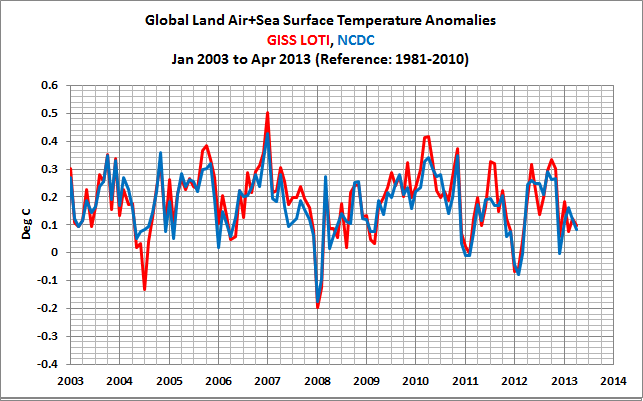
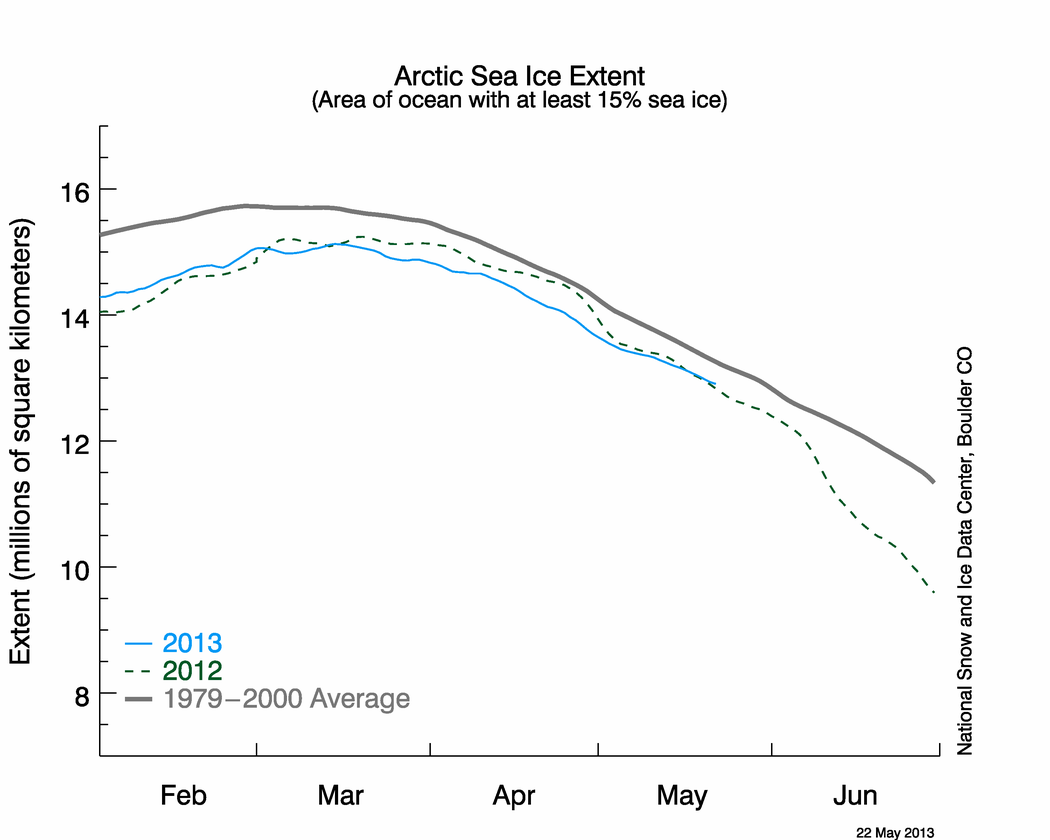
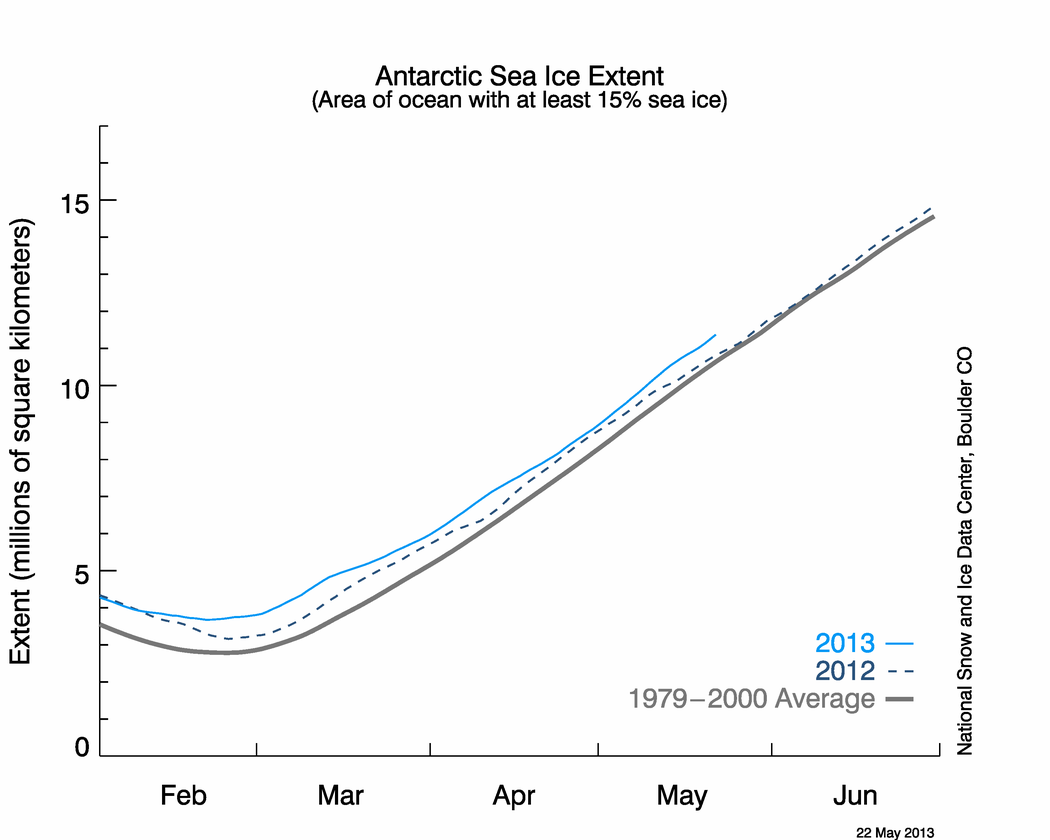
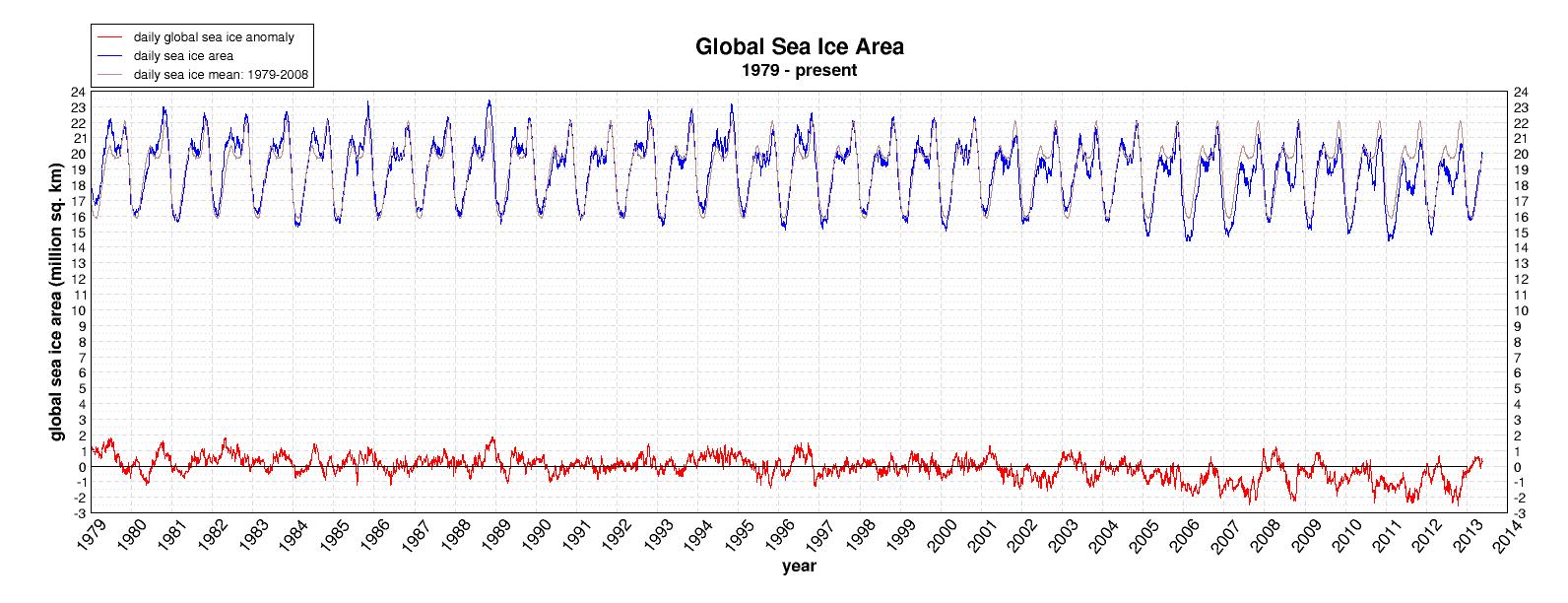
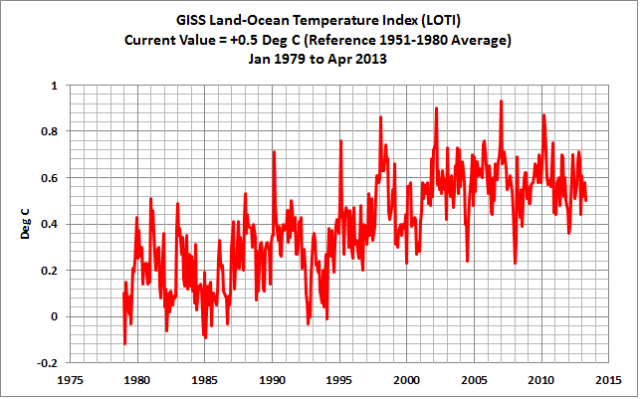
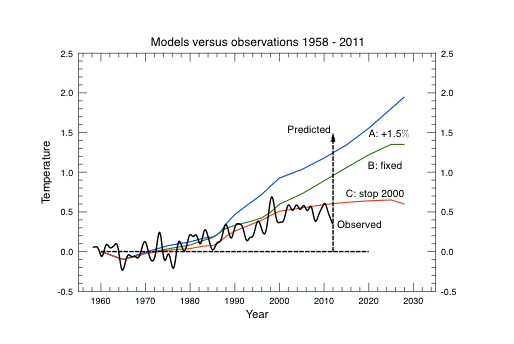

New Post: Global cooling update: The inconvenient truth is that global temperatures are slightly … http://t.co/HSMXPcmbxF #LDS #Mormon
Back in the 70s, they were warning about a global cooling in our future. We just don’t know enough about what we don’t know to know enough to predict.
Global cooling update: http://t.co/Hg5ZyWxHj0
Is it possible that the last 15 years has been masked by volcano eruptions and unusual El Nino and La Nina cycles?
RT @Millennialstar: New Post: Global cooling update: The inconvenient truth is that global temperatures are slightly … http://t.co/HSMXPc…
TheMillennialStar: Global cooling update http://t.co/3zbN90hD5e #lds #mormon
Rich, there are a LOT of problems with the Skeptical Science video. Take a look here :
http://wattsupwiththat.com/2013/04/07/the-blatant-errors-in-the-skepticalscience-video-global-warming-over-the-last-16-years/
I’ve never been so frustrated about a topic than the Global temperature debate. I have concluded that I cannot trust data for it is either pro-global warming or anti-global warming.
Whether the earth is cycling through a dip or a peak in temps, all I want to read up on is peoples take on the implications. I understand that the alarmists sometimes align with the millennialists. Other than that, what are we looking at? D&C talks about the Lord having provided the earth with plenty of resources, and we are taught also that we are to have a *righteous* dominion over the earth….
Other than that, why do we care?
Earlier this year the Miami Heat went on a 27 game win streak. People began thinking, “hey, based on the overwhelming evidence this team is pretty good.” Then they lost a game, and someone, somewhere, sniffed, “Hah, I told you all along they weren’t!”
Of all the temperature record databases available, NASA GISS is the least reliable (the one used in the Skeptical Science video above). It was (until just recently, when Jim Hansen resigned so he could be even more active in the politics of global warming which his employment at NASA limited) run by an activist who suggested CEOs of energy companies be tried for “crimes against humanity,” testified in favor of vandalism to energy facilities, etc. His adjustments to raw temperatures always seemed to confirm his biases.
As an example of what happened under his leadership, the U.S. had shown no warming whatsoever up to the year 2000. Hansen decided to change how the raw temperatures were manipulated and, voila, there was warming post 2000. This graphic shows the difference between pre- and post-2000 temperatures (the graphs are the actual copies from NASA’s web page): http://stevengoddard.files.wordpress.com/2010/10/1998changesannotated.gif?w=500&h=355&h=355
NASA GISS also infills temperatures where no temperature data is available, including the Arctic. The problem with this, as an example, is that Hansen infills Arctic see ice temperatures by extrapolation/interpolation from coastal temperature measurements where a lack of sea ice (which melts first near coastlines) means they are being warmed by open-water, moderating ocean temperatures that are not representative of the Arctic itself. These coastally higher temperatures get extrapolated over the still ice-covered Arctic ocean areas where temperatures are much lower and artificially produces an anomalously warm Arctic. These temperature extrapolations/interpolations are done for areas as far as 1200 km away from the actual thermometers.
There’s a host of other issues with manually manipulating the raw data (which is done with all temperature databases), but they have universally artificially cooled the past and warmed the present. The data released to the public in the form of a global temperature are always the post-processed data, not the raw thermometer data that is actually recorded. It is ripe for abuse by those whose funding depends on the politics of global warming. Regarding NASA GISS, here’s a quick synopsis of the impact: http://stevengoddard.wordpress.com/data-tampering-at-ushcngiss/ . You’ll note how adjustments of both USHCN (U.S. Historical Climate Network) and NASA GISS final temperature products cool past raw temperatures and warm the present.
Adjustments of actual (raw) temperature measurements like this are typical of all current temperature data sources. Warming caused by land-use changes, the urban heat island effect, and other important players in temperature are likewise not accounted for in most temperature data sources. For example, as irrigation of the central valley of California increased over the years, temperatures increased correspondingly because of evaporation from the irrigated fields (water vapor is a far stronger greenhouse gas than CO2). The same is true as land is converted to farming (darker soils of plowed fields absorb more sunlight) and other uses, especially urban ones. Rural/semi-rural thermometers which become more urbanized due to development will show artificial warming unrelated to actual climate.
Likewise, it’s also improper to remove El Nino & La Nina effects on global temperatures because El Ninos do not simply “disappear” and do not behave in an analogous manner to La Ninas. El Nino warm water conditions are not *replaced* by La Ninas, but are, rather, spread around the Pacific & Indian Oceans by ocean currents (after the El Nino disappears, the warmer surface water remains) where it continues to contribute to anomalous warming of global temperatures. La Ninas do not reverse the process, so global temperatures will be permanently warmer after El Ninos, with slow cooling in between episodes.
El Ninos occur more frequently and with greater intensity during positive (“warm”) Pacific Decadal Oscillation (PDO) modes, which characterized the Pacific up until the late 1990s, when it switched to a more neutral mode and global warming stopped (see http://jisao.washington.edu/pdo/img/pdo_latest.png — it has essentially begun the “cold” (negative) mode of its multi-decadal oscillation).
The head of the IPCC (an alarmist in his own right, but that’s another story) has put the lack of global warming at 17 years, which is about right. The Skeptical Science blog is blowing smoke here (it often does so dishonestly in its narratives, if one assumes the site owner’s competence [he’s an Australian scientist who claims competence, but is very alarmist in his and his site’s advocacy efforts]).
The Atlantic Multidecadal Oscillation (AMO) is currently in its “warm” (positive) mode. When it also turns negative (which it will do in the coming decades), global temperatures will likely cool substantially (where tenths of a degree are considered substantial in the climate change debate).
That previous post was directed in response to Richard Alger’s post.
Dallske, we care because statists are using global warming as an excuse to control our lives, everything from what kind of light bulbs we can buy to what kind of car we can drive, how much we pay electricity, etc. Europe right now is tearing down global warming alarmist laws because they have helped ruin the economy, putting people out of work and destroying lives. So yes we should care.
Casey, a better comparison is to the Chicago Cubs and its fans. The Cubs’ winning percentage goes up and down but they haven’t won a World Series in more than 100 years. But their fans, filled with fervor, claim they are a huge success and try to convince the rest of the world they are the best in the world. They invent data, pushing up batting averages and lowering ERAs. They claim winning percentages that never happened. And then they interview 100 random fans with season tickets and, low and behold, 97 percent of them claim the Cubs are the best team in the world.
John M, good comment.
As a 4th generation Cubs fan, I wouldn’t say they were the best in the world, just that they’re my team, and I have faith they’ll get back to the big game eventually (though not likely this year, the way it’s going).
I am not familiar with Bob Tisdale the author of
http://wattsupwiththat.com/2013/04/07/the-blatant-errors-in-the-skepticalscience-video-global-warming-over-the-last-16-years/
Here is a Forbes article addressing some of the objections I have heard about human caused global warming. They seem somewhat reasonable to me. How do I sift bias from bias?
http://www.forbes.com/sites/matthewherper/2013/02/18/why-republicans-should-embrace-the-reality-of-climate-change/
Frank, it is good to see you are not part of the “Cubs are the best in the world” consensus. There are reasonable people, even among Cubs fans, who don’t blindly accept what other people say without doing some research on their own.
Rich, that Forbes article shows its bias right from the first paragraph. I am not sure how to reach you if a)I clearly show that the AGW predictions have nothing to do with reality and b)I clearly show that total ice on the Earth has been stable for more than 30 years. This is not bias. It is simply evidence based on facts.
I am just a regular guy trying to sort out fact from fiction.
The Forbes article says “the vast majority of scientists” believe that AGW is real. Is this correct? If not where can find a less biased tally? Even if it is true, it does not mean that AGW is correct. I am just trying to a gage on the lay of the land here.
Rich, I have a few things you may want to read. First, on the “consensus:”
http://wattsupwiththat.com/2013/05/22/the-collapsing-consensus/
Second, you may have heard that “the overwhelming number of peer-reviewed publications support the consensus.” Take 15 minutes and scroll through the abstracts of some of these 1100-plus peer-reviewed articles that question the “consensus.”
http://www.populartechnology.net/2009/10/peer-reviewed-papers-supporting.html
Is it warmer than 40 years ago? Yes. Is Co2 going up? Yes. Has the warming gone up in any way even close to what alarmists predicted? NO, not even close. Are the polar ice caps melting as a whole on the entire planet? No. Are polar bears decreasing? No, they are increasing in numbers. Are the numbers of tornadoes increasing? No, they are decreasing. How about harmful hurricanes? No, they are decreasing? How about the supposed disappearing glaciers in the Himalayas? Not happening. It goes on and on.
Follow the money: who makes money promoting the alarmism? All of the major alarmists from Al Gore down have become rich promoting alarmism. You don’t get a grant unless you support the “consensus.” Who are the primary skeptics? Lord Monckton, Anthony Watts, Steve McIntyre, Bob Tisdale. None of them is being paid off by the oil companies. There are very respected skeptics who are recognized climate scientists, including Judith Curry, Richard Lindzen, Roy Spencer, Roger Pielke. None of these people is rich or being paid off by the oil companies.
Last point: you don’t determine if something is true based on whether a majority of scientists think it is true. Scientists are specialists these days and don’t necessarily see the big picture. They may see warming in their small area of study (like the Arctic), but they don’t see the bigger picture that the total global amount of ice when you include the Antarctic is stable. So, you will inevitably see some group of scientists visiting the Arctic and moaning about climate change and receding ice (which is happening there). But they are ignoring the planet-wide situation.
It seems to me the safest position to take is: there has been some warming overall, and CO2 is going up, but none of the alarming predicted results are taking place, and the warming seems to have stopped. Let’s see what happens next. This would be a prudent and thoughtful approach for us all.
“Follow the money” That is a wise course.
“It seems to me the safest position to take is: there has been some warming overall, and CO2 is going up, but none of the alarming predicted results are taking place, and the warming seems to have stopped. Let’s see what happens next. This would be a prudent and thoughtful approach for us all.”
I agree with this. Wait and see (for another 10-50 years) seems prudent.
“Last point: you don’t determine if something is true based on whether a majority of scientists think it is true”
So what is a better way to determine the truth? (In the absence of any prophetic authority).
As a PhD in the “hard sciences”… I get tired of people…
a) quoting “consensus” or “statistics” of scientists to determine truth. Truth is determined by objective observation, and if scientists on either side are unable to portray their beliefs (and they are beliefs…) convincingly, they don’t deserve to be believed.
b) Scientists insisting we trust them. Science is not about trust. Science is about convincing via persuasion. Humiliating someone into your viewpoint is about as noble as being an abortion doctor. All of these liberals have removed faith and trust in God and have replaced it faith and trust in “consensus of scientists.” Working with 100’s of scientists on a daily basis, I see huge problems with that. Having a PhD doesn’t remove us from our fallen mortal state, and faulty
“So what is a better way to determine the truth? (In the absence of any prophetic authority).”
Nate, there was a time when the majority of scientists in the Western world thought “bleeding” a patient was the best way to cure his ills. Science changes constantly, is constantly challenged and is constantly updated. I believe evolution exists in nature, but it is beyond doubt that what we understand about evolution today is completely different than what we understood 20 years ago. What we understand about the climate today is also different than what we understood 20 years ago. Anytime a scientist (or a promoter of a certain viewpoint) declares that “the debate is over,” especially when it comes to something as complex as the climate, you know you should not take them seriously.
“the debate is over” is how you define a dogmatic belief, not science…
Go to wunderground.com and look at the temp readings of weather stations in your area. Note the wide ranges. Consider how the terrain upwind of a station, and the micro-environment immediately around it affects the reading, pasture, crops, woods, residential, urban, etc. Consider that over decades, the terrain changes. Urbanization, new farms, etc. Consider the shade over each thermometer, small, or a lot, shaded by an awning, or a huge building. This happens for all weather stations around the world. Stations have to be moved at times. There is no control over surrounding conditions when a station is moved. Plus, did you know that thousands of stations were removed from the world wide database of weather stations used? There really is no accurate way to compare average worlwide temps over long periods down to less than a degree. Heck, no one can agree what the real temp in Indianapolis is within a 2 degree range. Even if you settle on one specific station like the airport, they have had to move the location of their thermometer over the years, and there is no guarantee that the micro-environment surrounding the thermometer has remained constant move to move.
Thanks for responding to my question Geoff. I agree with you that whenever someone claims “the debate is over” that is unscientific. Any scientist worth their salt would also agree.
But consensus scientists are not saying this. Political activists are. You clearly recognize that this is unscientific, and it is right for you to remind people that the debate is not over. But to me it seems you are arguing against consensus, not from a position of empirical and scientific expertise, but for your own ideological and political reasons. This would make you as guilty as those you condemn for using misunderstood data as a political weapon. You also use data in a biased way to promote your own political ideals.
Sure, scientific consensus often changes over time, but you wouldn’t automatically believe the opposite of everything scientists say for that reason. When one is not an expert, trusting in the consensus of experts offers the best chance for us to arrive at truth. One doesn’t need to be dogmatic about it. One can say “it could be wrong, but I’ll trust the experts for now since I’m not an expert.” Your only reason for rejecting expert consensus is because it contradicts your political and ideological viewpoints, not because “consensus is always wrong.”
Actually, I think arguing from a position political bias is completely valid, regardless of your bias. Politicians and scientists play different roles in the war for power and action in society. I just sometimes wish partisans would be honest about their biases, and humble enough to accept that they could be wrong too. But maybe that is contrary to the definition and role of a partisan.
Nate, I don’t think Geoff is “rejecting expert consensus” so much as rejecting the notion that there is an expert consensus.
And I think he’s more right about that than you might imagine — the “expert consensus” often cited leaves out experts who violate the consensus (since they are socially and academic punished for violating said consensus, and thus denounced as “non-experts”), and includes a great many scientists who aren’t actually briefed or trained in the field (such as, for example, microbiologists who support global warming claims — not even a matter related to their field of study).
You talk about political and ideological bias. What Geoff is saying (and I agree with him) is that the very claim that there exists an expert consensus on this matter is factually untrue, but the notion is preached as if it were true because of ideological and political bias.
So you’ve got Geoff all wrong here. He’s not rejecting a scientific consensus based on ideological grounds — he’s arguing against the existence of said consensus, and claiming that the supposed consensus (to the extent that it does exist and is enforced) is really ideologically and politically motivated.
That is an interesting take LDSP, and I wonder what Geoff would say about it. It seems that you believe, as I do, that scientific consensus does in fact carry a certain importance when forming objective opinion. Because you accept this, but also deny many of the alarmist claims, the so-called consensus must nescessarily be a some kind of fabrication, conspiracy, or misinterpretation. You are thinking rationally. Scientists are rational. Therefore, the scientists must be on your side, and any appearance to the contrary must be a conspiracy. I believe conspiracies are implausible explanations for complex, global phenomenon.
But perhaps you are suggesting, not that there is a conspiracy, but that political dogmas have infected the scientific community, making them unable to rationally measure the evidence, or determine the extent of the consensus. I certainly agree that there seems to be some political dogmatism that has hampered the scientific process on this issue. But I don’t know that I would throw everything out on this issue simply because of the muddy political waters.
Personally, I’m on the fence for this issue. I’m naturally sceptical about apocalyptic scenarios, whether they come from the political right, or left. I believe the world is getting better, not worse. But I’m in favor of political muscle to promote social change towards green energy. If political forces exagerate scientific claims for power, this is nothing new, and there is nothing immoral about it. Politics is about exageration, passion over reason, whether you are a Republican or a Democrat. People are emotional, not reasonable, and politicians must speak to their guts, not their minds, in order to win their votes. That’s why I’m a great admirer of Gore. He is no scientist, but he is a superb politician. But he walks a fine line, as all politicians do. If he goes too far, and if the science turns against him, he will be a laughingstock for generations to come. Or he will become the great saint of the early 21st century. That is the heady gamble of political aspiration.
Excellent article on this subject here:
http://www.forbes.com/sites/peterferrara/2013/05/26/to-the-horror-of-global-warming-alarmists-global-cooling-is-here/
Nate, I think your seconds paragraph sums up my thoughts on the matter. However, I would be certainly content to simply reject the consensus were it to actually exist (although I have no ideological basis for that and therefore no strong desire to). I end up rejecting “consensus” in psychology all the time, because I don’t believe that science is objective. . . I believe scientists of all disciplines are guided by philosophical predispositions and cultural assumptions (for example, psychological theories and studies are generally informed by psychological and ethical egoism, a non-empirical philosophical position that I reject). I bring that up to say that although your second paragraph matches my opinion, it is not because of any elevated respect for natural scientists and their opinions (as you imply in your first paragraph).
Nate, I think a consensus can be formed on scientific principles. Obviously, we have areas of science where a consensus is formed beyond a doubt and just about everybody agrees, whereas they might not have 200 to 300 years ago. I think the AGW crowd tried to force a consensus for political/environmental reasons before its time. The consensus was among a small group of scientists studying a huge and complex subject and therefore was never taken seriously by the larger scientific community. In addition, the AGW movement has a long history of manipulating data, hiding data and trying to change data so that it fits predetermined outcomes. (Climategate confirms this). My last graph in the OP shows this. The AGW movement started in the 1980s with dire predictions that simply haven’t come true. So, if the scientists involved were honest brokers of pure science, they would admit that they were wrong and move on. This is happening among some of them, but so many are tied to the money they have earned or the ideological cause that they have abandoned science in favor of pure political advocacy. So, frankly, many of the AGW promoters have lost any respect they once had.
This does NOT mean that we should abandon all hope for making the planet a better place to live. I tend to agree with you that the world is much better off than it was 100 years ago and will probably be better off overall in 50 years than it is now. We should study the reasons why this has happened. I support *some* environmental initiatives on a local level but tend to oppose them on a national level. We should also acknowledge that free, more prosperous people will, on their own, take steps to improve the environment around them. (A comparison of the environment in East Germany to West Germany in the 1980s shows this). So, we should have faith that people will tend to become better stewards of the Earth if we leave them alone.